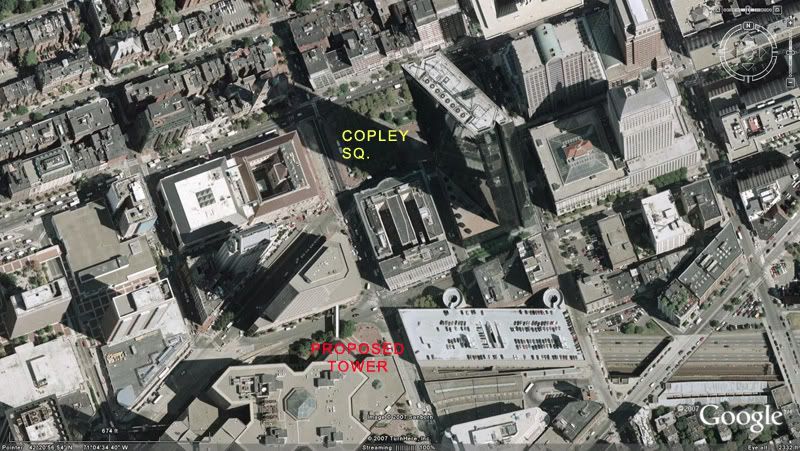Reporter Barred From Prudential Project Advisory Meeting
By Thomas Grillo
Reporter
Shut out. A reporter from a neighborhood newspaper was barred from a city advisory panel meeting last week in an apparent violation of the state?s Open Meeting Law.
Ted Siefer, who writes for The Boston Courant, a weekly newspaper distributed to 35,000 households in the downtown neighborhoods, was ejected from a meeting of the Prudential Project Advisory Committee (PruPAC) on Wednesday.
The 41-member group was established by former Mayor Raymond Flynn in the 1980s to advise City Hall on development projects near Boston?s Prudential Center. Flynn told Banker & Tradesman that he was disappointed that the press and the public were banned from the meeting.
?It was never my intention to keep the public or the press from attending any meetings,? he said. ?The reason we appointed these groups was to open up the windows and make the process wide open.?
On Wednesday afternoon, Elliott Laffer, PruPAC?s vice chairman, assured Banker & Tradesman that reporters would be allowed to cover the session as long as questions were reserved until after the meeting. He also asked that members not be quoted. The meeting was called to hear a presentation by Boston Properties on a pair of buildings the company plans to construct at the Prudential Center.
On Thursday, Laffer declined to say who raised the objection to the public being present. He also refused to say how he voted on that presence and said only that the vote was overwhelmingly against having the public in the room.
Siefer said Richard Kiley, a representative of the Fenway Civic Association on PruPAC, raised the objection to the media?s presence and made a motion to evict him. Kiley is a schoolteacher who no longer lives in the Fenway area. He could not be reached for comment.
William Richardson, president of the Fenway Civic Association, said he did not support the move to keep the press out. ?I have never run a meeting that kept the press out,? he said.
?A Different View?
Siefer said at least four members voted to keep the press in the room, including state Rep. Martha M. Walz; Marc Lederman, who represented the Fenway Community Development Corp.; Walter Salvi from NSTAR; and Meg Mainzer Cohen of the Back Bay Association.
Laffer defended the vote to keep the meeting private. ?Over its 20-year history, PruPAC had not been public and not had allowed reporters in the room,? he said. ?The downside to having reporters in the room is that it inhibits discussion. Frankly, we worry about saying something that might be perceived as stupid.?
Betsy Johnson, the PruPAC chairman, also defended the panel?s vote to keep the public and the press out. She said even during the Flynn administration, the ?working sessions? were private.
?The private sessions were the policy when Flynn was mayor and no one from the Boston Redevelopment Authority or the administration spoke up at that time. It?s not like we?ve been open for 15 years and now this meeting was closed,? she said. ?We are very proud of our accomplishments, but our work has been compromised by untimely references and quotes in the press. We?ve had a process that is not broke, and why change it at this point??
Siefer said John O?Brien, the BRA?s project manager who attended the meeting, advised PruPAC that an understanding had been reached with the Courant and other papers that such meetings are open, but the ground rules are that no one should be quoted during the session.
?He also said these meetings are not covered by the Open Meeting Law,? Siefer said. ?But I said the [district attorney] has a different view of that.?
Jake Wark, a spokesman for Suffolk District Attorney Daniel F. Conley, said while his office has not ruled on PruPAC meetings, he noted that the office previously has offered on an opinion on a case that involved the Harvard Allston Task Force. In that case, the public was barred from a session.
In a letter to the BRA in June, Conley wrote, ?Where members of a governmental body meet to discuss public business in private ? this action constitutes a meeting under the Open Meeting Law.?
In a prepared statement, the BRA said, ?Because the BRA encourages groups like PruPAC to allow members of the public to observe their meetings that address development proposals, we are disappointed with PruPAC?s recent actions. As part of the BRA?s review process, there will be an opportunity for all members of the public to participate in the discussion about this project.?
David Jacobs, the Courant publisher, said he plans to contact the Massachusetts Attorney General Martha Coakley?s office and Conley?s office to advise them that PruPAC is violating the state?s Open Meeting Law.
?I have declared jihad on these closed meetings,? Jacobs said. ?I understand the need for working group meetings, but we?re talking about $100 million projects that impact all of us and the decision-making leading up to proposals are vital because projects have a way of building momentum and by the time the public hears about them they have a life of their own.?
Siefer noted that as he was being tossed out of the meeting, he was offered a treat.
??Take a brownie on the way out,? someone said to me,? he said. ?I declined.?

